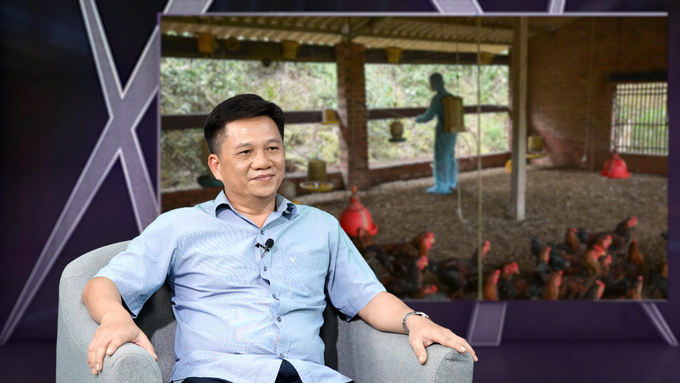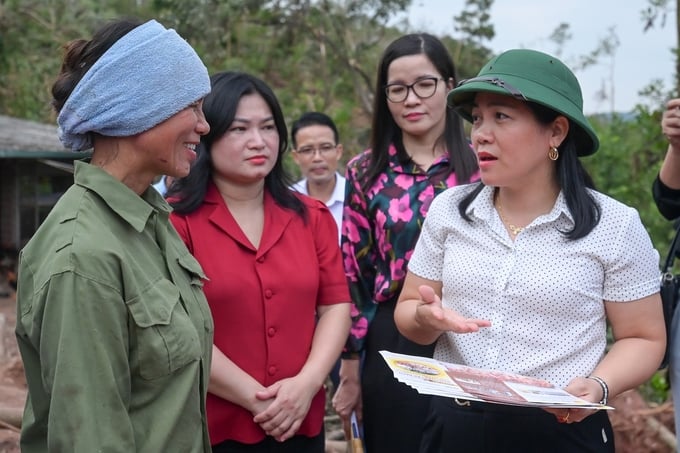June 5, 2025 | 12:16 GMT +7
June 5, 2025 | 12:16 GMT +7
Hotline: 0913.378.918
June 5, 2025 | 12:16 GMT +7
Hotline: 0913.378.918

According to Le Minh Linh, Deputy Director of the National Agricultural Extension Center, as floodwaters recede, the center has instructed local farmers to follow the principle of "rebuild where the waters recede." Photo: Hoai Tho.
The recent Typhoon No. 3 has caused significant damage in many regions nationwide, significantly impacting crop and livestock production. In response to this urgent challenge, the National Agricultural Extension Center has taken proactive steps in coordination with local agricultural extension centers and the banking system to support affected farmers.
Le Minh Linh, Deputy Director of the National Agricultural Extension Center, stated that as floodwaters receded, the center immediately launched a campaign to promote restoration efforts in different regions. This initiative aims to help farmers quickly stabilize their livelihoods and resume production.
"We have collaborated with experts to develop nine sets of technical guides and distributed over a million leaflets with advice on livestock, forestry, and aquaculture to assist farmers," Deputy Director Linh reported.
In addition to technical support, the center has partnered with financial institutions, such as Agribank and the Social Policy Bank, to provide preferential loans. These funds are crucial for farmers looking to repair livestock facilities and invest in production. However, several households have reported difficulties in accessing these loans due to lengthy procedures and disbursement schedules.
Regarding livestock production, the National Agricultural Extension Center is focusing on short-cycle models such as poultry and waterfowl, as these animals have quick turnaround times and can provide farmers with an immediate source of income.
"Poultry such as chickens and ducks can help farmers restore their economic base within just three to four months. This supply is especially important as the end of the year approaches," Deputy Director Linh explained.
Nonetheless, some experts suggest the need to diversify livestock types to mitigate risks in the increasingly complex context of climate change.

Agricultural extension officials at both the central and local levels are assisting farmers in restoring the livestock sector following Typhoon No. 3. Photo: Hoai Tho.
In addition to support from government agencies, the business community plays a crucial role in the recovery process of the livestock sector. Accordingly, many companies have supplied farmers with breeding stock, feed, vaccines, and disinfectants, in addition to purchasing their agricultural outputs. The involvement of these businesses has significantly eased the financial burden on farmers after the typhoon.
Deputy Director Linh emphasized that stakeholders must sustain and further expand this collaboration to help farmers recover and achieve sustainable development.
Despite the positive results, the production recovery process faces significant challenges. Notably, livestock facilities and agricultural infrastructure in heavily affected areas require considerable time and financial investment to rebuild.
Furthermore, support from businesses and banks remains inaccessible for a number of households. Farmers have reported that, despite the availability of financial and technical assistance, they are concerned about unpredictable weather patterns following the typhoon and the risk of disease outbreaks.
"We understand that recovery after a natural disaster is a challenging and lengthy process. As a result, the National Agricultural Extension Center will continue to support farmers, addressing immediate needs while also working toward long-term solutions," Deputy Director Linh affirmed.
The recovery of production following Storm No. 3 is not the sole responsibility of agricultural extension agencies or businesses; it necessitates collaboration among various stakeholders, including farmers, the government, and financial organizations.
According to Deputy Director of the Department of Livestock Production Pham Kim Dang, in addition to emergency measures, boosting livestock immunity has also become a priority task. After a natural disaster, livestock require special tending procedures to recover health and enhance disease resistance. Farmers are advised to strictly follow tending and hygiene protocols as well as ensure vaccinations as instructed by local veterinary agencies.
Farmers require support from the government, business community and technical agencies to recover from the damages of natural distasters. Coordinated efforts from all stakeholders have mitigated damages and enable farmers to quickly rebuild their livestock herds, preparing essential food supplies for the year-end market.
“With support measures that encompass breeding stock, feed, finances, and technical assistance, we expect the livestock sector to stabilize and recover from Typhoon No. 3 in the near future. This will allow the sector to protect social welfare and meet consumer demand for the upcoming Lunar New Year holidays,” emphasized Deputy Director Pham Dang.
Translated by Nguyen Hai Long

(VAN) TTC AgriS and IFC signed a strategic partnership to develop a sustainable agricultural value chain, aiming to achieve the Net Zero target by 2035.

(VAN) Seafood by-products are opening a new path, combining green growth and technological innovation to enhance the industry's value.

(VAN) Mr. Nguyen Thanh Cong, Vice Chairman of the Son La Provincial People's Committee, reflects on Son La’s journey from barren hills to fruitful orchards after a decade of hard work.

(VAN) FAO’s Director-General addresses the 5th Baghdad International Water Conference.
/2025/05/26/1716-4-nongnghiep-191706.jpg)
(VAN) Chain linkages, technological innovation, and raw material zoning are three strategic pillars for the coconut industry to strongly develop and elevate its position on the global agricultural map.
![Advanced mariculture – an inevitable trend: [4] Accompanied by scientists](https://t.ex-cdn.com/nongnghiepmoitruong.vn/608w/files/sohk/2025/05/13/1941-pgsts-vo-van-nha-140958_717.jpg)
(VAN) According to Assoc. Prof. Dr. Vo Van Nha, Director of the RIA III, the development of advanced offshore mariculture is no longer an option but an essential path for Vietnam’s fisheries sector.

(VAN) Vietnam is intensifying the development of mollusk farming areas that meet international standards, aiming for sustainable growth and enhancing its export position in the global seafood market.